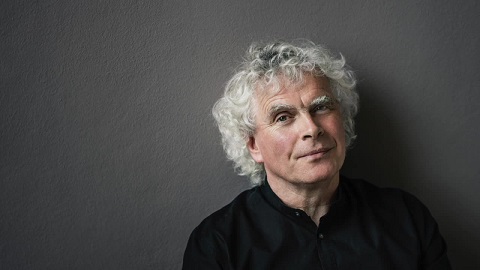If Simon Rattle can achieve such excellence in the cramped confines of the
Barbican Hall, imagine how Britain's cultural life would be transformed if
a world class concert hall with state of the art facilities were built. The
arts are central to the nation's economy and prestige. Britain cannot
afford to slip.
As Rattle has said, the London Symphony Orchestra have the potential to do
a lot more repertoire, given the chance. Berlioz The Damnation of Faust is
an extravagant work. The stage was crowded with performers, and the volume
projected into the shoebox that is the Barbican Hall threatened at times to
overwhelm. On the BBC Radio 3 re broadcast and on medici.tv the sound balance
might be better, but the live experience was intoxicating, despite the
acoustic. Wisely, Rattle held his forces back, emphasizing instead the
intricate orchestration and textures that make this piece so exciting. It
is a sprawling drama, whose theatrical effects are embedded in the music.
In Berlioz's time audiences didn't need literal realism. They paid
attention to the music. This performance was so vivid that the Barbican
Hall seemed transformed as if by magic, as Berlioz's music came alive.
Faust, the old scholar, watches peasants dancing in the countryside. "Tra
la la , Haha ha!" sing the chorus. It is Easter. Spring has come. Nature
blossoms. Christ has risen. Dare Faust dream of rejuvenation? Bryan Hymel
sang Faust, the rich, ringing warmth in his voice bringing colour to the
role. Hymel then injected chill fear.
"Hélas! doux chants du ciel, pourquoi dans sa poussière Réveiller le
maudit?
". Faust is no fool: he already senses the immensity of what is to come.
A Faust as strong as Hymel needs an equally singular Méphistophélès.
Christopher Purves provided an authoritative counterbalance. The
expressiveness in Hymel's voice contrasted with the authority in Purves's
voice and his purposeful enunciation. The way Purves sang "Ô pure émotion!"
showed how Méphistophélès had sized Faust up. A strong Brander, too, in
Gabor Bretz. Though the part isn't big, it's important, for Brander is to
the students what Méphistophélès is to Faust. The chorus sang lines that
swayed from side to side, as drinkers do. But an undercurrent of violence
runs through the merriment. Purves sings the Song of the Flea but
the drunks think it's funny. In the Voici des roses, Purves
suggested the thoughtful side of Méphistophélès.'s character: low winds and
strings evoking melancholy. The devil is dangerous because he understands
human sensitivity, and uses that to manipulate. Perhaps Méphistophélès is a
kind of Oberon, for Faust is lulled into a dream by a magical flute melody,
later taken up by the strings, and the songs of gnomes and sylphs. A
magical scene which owes much to Mendelssohn.
For Faust, a reverie of love. For the students, mindless delusion as they
march off to war. Hymel's aria "Merci, doux crépuscule! " was a
star turn, beautifully articulated, glowing with feeling. The phrase "Que
j’aime ce silence," glowed beautifully, followed by a deeply felt "et comme
je respire Un air pur!" The orchestra responded in kind, with transparently
delicate textures. When Méphistophélès. butts in, a violin plucks a banal
ditty, like a student with a lute. But Faust is made of far finer stff, as
is Marguerite. Karen Cargill sang the Song of the King of Thule
with sincerity. The song is a paean to fidelity, loyalty so strong it
defies death. Garlanded by viola and cellos, it's anothe moment of
"silence" where Méphistophélès and the world cannot reach.
Berlioz's The Damnation of Faust owes as much to Shakespeatre as
to Goethe. In the magical Evocation, fireflies dance, piccolos playing
bright figures augmented by darker hued winds and strings. Textures as
transparent as these need this kind of definition There was humour, too, in
the trombones and tuba, which not every orchestra can carry off as well as
the LSO. Purves curled his tongue around the final words, with the menace
of a snake, for now Faust and Marguerite have their encounter. Hymel's " Ange adoré" glowed resplendently, and his cry "Marguerite est à
moi!" scaled the heights. But the world intrudes. After fast paced
exchanges, the lovers are torn apart. The cross currents between soloists,
choirs and orchestra were very well defined.
Then, back to solitude. Cargill's Romance showed her at her finest. matched
by evocative oboe accompaniment. Although some incarnations of Faust
emphasize the God/Devil angles in the legend, Berlioz was very much a
Romantic, for whom Nature was an alternative diety. Thus, the importance of
the Invocation. Hymel sang the aria Nature immense, impénétrable et fière,
with such fervour it seemed an act of faith. But Fast is doomed.
Méphistophélès and Faust set off on horses that fly through the sky,
defying the laws of Nature. Wailing woodwinds, and a frenzied pace in the
orchestra, tensely plucked pizzicato. The children's voices screamed "Ah!"
and the tubas wailed pounding staccato, Now, Méphistophélès has little need
for formal language. "Hop! Hop!" screamed Purves. My flesh creeped,
thinking of the "Hop Hop" at the end of Wozzeck. The men's chorus walked on
stage, among the orchestra, singing their demonic chorus: skat lyrics
before the term was invented, interspersed with machine-gun staccato. Are
the demons the students and soldiers?
"Hosana!" sang the choirs at the back of the stage. Harps sggested angels,
and the palpitating, ascending rhythms, the flapping of wings, or the image
of water (as opposed to the fires of hell). And then the children's choirs
filed into the auditorium, illuminating the darkness with their high, pure
voices. Like a miracle!
Anne Ozorio
Hector Berlioz: The Damnation of Faust
Sir Simon Rattle, London Symphony Orchestra, Bruyan Hymel, Christopher
Purves, Karen Cargill, Gabor Bretz, London Symphony Chorus (concertmaster
Simon Halsey) Tiffin School Choirs (concert master James Day).
Barbican Hall, London. Sunday 17th September 2017
